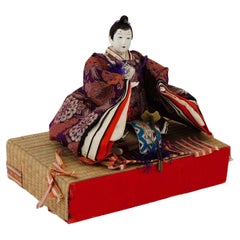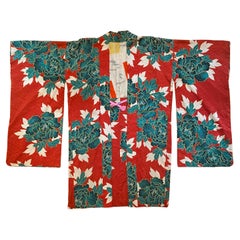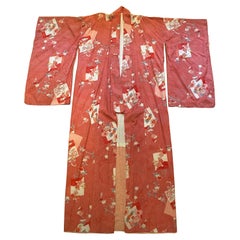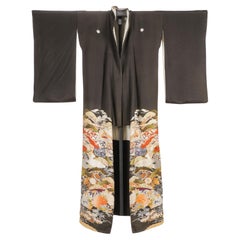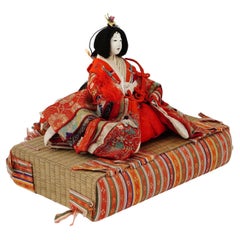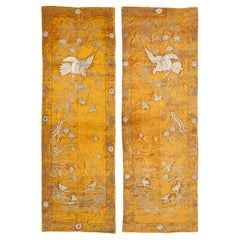Japanese Textiles
to
11
122
14
153
25
1
23
1
1
3
55
95
26
53
25
2
5
1
4
1
2
1
173
94
39
33
32
13,923
1,326
462
443
432
179
176
179
3
Place of Origin: Japanese
Antique Japanese Taisho Period Hinamatsuri Doll
Located in Long Island City, NY
An antique traditional Japanese Hinamatsuri Ningyo doll for traditional Girls Day celebration, most likely from the Taisho period, 1912 to 1926. The doll depicts a Japanese emperor w...
Category
Early 20th Century Meiji Japanese Textiles
Materials
Textile, Wood
Antique Japanese Silk Kimono
Located in Bedford Hills, NY
Beautiful antique silk Japanese Kimono.
Category
Early 20th Century Anglo-Japanese Japanese Textiles
Materials
Silk
Antique Japanese Silk Kimono
Located in Bedford Hills, NY
Beautiful antique Japanese silk Kimono.
Category
Early 20th Century Anglo-Japanese Japanese Textiles
Materials
Silk
Antique Japanese handmade Black Silk Kimono Meiji Period
Located in Norton, MA
BEAUTIFUL JAPANESE SILK KMIONO, MEIJI. In colorful floral, foliate, and landscape motif, length from collar to bottom of hem 61 inches, width from shoulder to shoulder 50 inches. Sta...
Category
19th Century Antique Japanese Textiles
Materials
Silk
Antique Japanese Taisho Period Hinamatsuri Doll
Located in Long Island City, NY
An antique traditional Japanese Hinamatsuri Ningyo doll for traditional Girls Day celebration, most likely from the Taisho period, 1912 to 1926. The doll depicts a Japanese empress w...
Category
Early 20th Century Meiji Japanese Textiles
Materials
Textile, Wood
Rare Pair of Japanese Meiji Period Silver Thread Embroideries on Silk Velvet
Located in Milan, IT
A rare and exquisite pair of antique Japanese embroideries woven during the Meiji period (1868-1912), at a time when the Japanese arts and crafts had been discovered by a selected fe...
Category
1870s Meiji Antique Japanese Textiles
Materials
Silver Leaf
Japanese Antique Blue Doorway Curtain Noren for Happiness And Longevity
Located in South Burlington, VT
Symbolizing Happiness And Longevity
Japan, a rare antique hemp noren (doorway curtain) with auspicious congratulatory crane and turtle figures symbolic for happiness and longevity....
Category
1920s Showa Vintage Japanese Textiles
Materials
Textile, Hemp
Framed Japanese Embroidery Dragon Tapestry Meiji Period
Located in Atlanta, GA
A striking Japanese embroidery tapestry circa 1890s Meiji period presented in a gilt wood frame under glaze. The design features four dragons coiling and slithering in the clouds. The most auspicious mythological creature, dragon was a very popular motif in Japanese textile art. Viewing this particular piece, one is struck by the superb craftsmanship with the profuse use of silver threads in satin stitches and complex chain stich coiling that create the background. The slight relief technique was also used on parts of the dragon heads, rendering the piece a strong sense of dimension and motion. The textile itself measures about 32.5"x46".
Japanese Meiji textiles were widely exhibited in the west during turn of the 20th century at the international exposition. It was used to showcase the Japanese aesthetics with the techniques at their pinnacle. These expositions solidified the country's images overseas and felled the Japanese craze in the west, which turned out to be a long-lasting influence on the western art. Many pieces were purchased and stayed in the west. As there is no brocade border present, the piece is likely the main part with the central motifs of a larger tapestry and was later framed for display.
For two similar dragon tapestries...
Category
1890s Meiji Antique Japanese Textiles
Materials
Textile, Wood
Japanese Indigo Dyed Old Embroidery Cloth / Japanese Toy Pattern / 1912-1960
Located in Sammu-shi, Chiba
It is a Japanese indigo dyed antique cloth.
It calls its name "fu-ro-shi-ki".
Originally used in the dressing room of the public bath "furo" during the...
Category
Early 20th Century Showa Japanese Textiles
Materials
Cotton
Japanese Woven Asa Double Ikat Summer Usumono Kimono Provenance
Located in Atlanta, GA
A “Natsu No Kimono” (summer kimono) also called “Usumono" (thin clothes) dated from early 20th century Taisho Period. This well-preserved garment was tailored from a woven indigo blu...
Category
Early 20th Century Taisho Japanese Textiles
Materials
Linen
Fabric Divider, Cotton Noren with Kakumoji Character, Japan, Early 20th Century
Located in Tokyo, Tokyo
This is a traditional Japanese noren (fabric shop curtain) dating to the Taisho period (1912–1926), crafted from cotton dyed with persimmon tannin (kakishibu). Over time, the dye has...
Category
Early 20th Century Japanese Textiles
Materials
Cotton
Japanese Doll Set With Screen And Other Pieces
Located in Long Island City, NY
A set of mid 20th century Japanese Sato Hakata Urasaki genuine clay dolls, hand woven textile, screen and othe pieces. The dolls are adorned with hand crafted and hand painted tradit...
Category
Mid-20th Century Meiji Japanese Textiles
Materials
Textile, Clay
$840 Sale Price / set
30% Off
Silk Brocade Japanese Kimono Ceremonial Gown
Located in Vienna, AT
Japanese kimono, richly decorated with polychrome embroideries with silk and metallic threading, featuring a motif of flowering prunus to a cream-white ground. Lined with bright red ...
Category
1920s Showa Vintage Japanese Textiles
Materials
Silk
Exceptional Embroidered Japanese Ceremonial Kimono
Located in Atlanta, GA
A visually striking antique Uchikake Wedding Kimono/Robe for ceremonial occasion, circa end of Meiji to Taisho period 1910s-1930s. This bridal outer garment is of a bright red color ...
Category
20th Century Japonisme Japanese Textiles
Materials
Brocade, Silk
Vintage Japanese Ceremonial Kimono Gold Brocade with Flying Cranes
Located in North Hollywood, CA
A vintage Mid-Century ivory color silk brocade collectable Japanese ceremonial kimono. One of a kind hand crafted.
Fabulous museum quality ceremonial piece in pure silk with intricat...
Category
20th Century Japonisme Japanese Textiles
Materials
Silk
Fine Japanese Lacquer Takamakura Geisha Pillow, First Half of the 20th Century
Located in Ottawa, Ontario
A fine Japanese lacquer Takamakura Geisha pillow, first half of the 20th century. Depicting Shi-Shi Lion between peony and rock in gold, silver, red and ...
Category
Late 19th Century Japonisme Antique Japanese Textiles
Materials
Abalone, Lacquer
Vintage Hand-Painted Silk Kimono with Gold Embroidery - Japan - 20th Century
Located in Chatham, ON
Vintage fine quality silk kimono - hand sewn with gold embroidery - hand-painted silk textile - white silk crepe and off-white rayon lining - signed - original label attached to the ...
Category
Mid-20th Century Japonisme Japanese Textiles
Materials
Silk
Divider, Tsutsugaki Aigaeshi-Dyed Noren with Family Crest, Japan, 19th Century
Located in Tokyo, Tokyo
This is a traditional Japanese noren (fabric divider) from the late Edo period, created in Yamagata Prefecture in the 19th century. Crafted from hand-spun and hand-woven hemp, it fea...
Category
19th Century Antique Japanese Textiles
Materials
Fabric
The sky visible at Honmonji TempleⅣ by Blue Tip Atelier
Located in Sammu-shi, Chiba
Title : The sky visible at Honmonji TemplⅣ
Japan / 2024s
Size : W 275 H 395mm
A mini series of the sky as seen from Honmonji Temple.
Natural dyes used are Indian madder and oak g...
Category
2010s Modern Japanese Textiles
Materials
Linen
Framed Japanese Festival Kimono with Tsutshugaki Dye
Located in Atlanta, GA
A Japanese festival kimono expertly mounted and displayed in a large acrylic shadow box. This impressive ceremonial garment circa late 19th-early 20th century was made from a thick l...
Category
Early 20th Century Japonisme Japanese Textiles
Materials
Textile, Acrylic
Exceptional Japanese Summer Asa Hitoe Weft Ikat Kimono Provenance
Located in Atlanta, GA
A super fine Japanese summer unlined (Hitoe) Kimono made with a soft Asa fiber blended with silk. The garment was hand-stitched and dated to circa 1930-50s Showa period. It is hard t...
Category
Mid-20th Century Showa Japanese Textiles
Materials
Linen, Silk
Vintage Kimono Red Silk Brocade Japanese Ceremonial Wedding Dress
Located in North Hollywood, CA
A vintage midcentury red color silk brocade collectable Japanese ceremonial wedding kimono.
One of a kind handcrafted .
Fabulous museum quality ceremonial piece in pure silk with ...
Category
20th Century Japonisme Japanese Textiles
Materials
Silk
Vintage Japanese Ceremonial Wedding Kimono with Embroidery Designs
Located in Atlanta, GA
A large Japanese Wedding Kimono with bold embroidery designs. The auspicious attire was known as Uchikake and was worn by the bride during the wedding ceremony made from silk and hea...
Category
Early 20th Century Japonisme Japanese Textiles
Materials
Brocade, Silk
Framed Japanese Embroidery Textile Panel Pagoda Scenery
Located in Atlanta, GA
A Japanese silk embroidery landscape scenery panel depicting a Buddhist pagoda and a temple compound set in a forest with towering pines and...
Category
Early 20th Century Japonisme Japanese Textiles
Materials
Metal
Vintage Kimono Silk Brocade Japanese Ceremonial 1970
Located in North Hollywood, CA
A vintage Mid-Century ivory color silk brocade collectable Japanese ceremonial kimono. One of a kind.
Fabulous museum quality ceremonial kimono in pure silk with intricate detailed h...
Category
20th Century Japonisme Japanese Textiles
Materials
Silk
Vintage Japanese Silk Brocade Embroidery Ceremonial Kimono in Green, Red, Blue
Located in Barrington, IL
An exceptional and visually arresting vintage Uchikake wedding kimono from the late Meiji to early Taisho period (circa 1910s–1930s), originally designed for ceremonial bridal wear. ...
Category
Early 20th Century Japanese Textiles
Materials
Brocade, Silk
Japanese Art Deco Ikat Silk Meisen Kimono
Located in Atlanta, GA
A well preserved Japanese Meisen kimono hand-sewn from woven Ikat Silk circa 1920-30s (Taisho to early Showa period). The kosode style kimono (small slee...
Category
Early 20th Century Showa Japanese Textiles
Materials
Silk
Japanese Obi with Landscape and Pavilion Motif – wall decoration, table runner
Located in Fukuoka, JP
A stunning Japanese obi textile from the Shōwa period, masterfully woven from silk with exquisite raden (mother-of-pearl inlay) detailing. This formal maru obi features a rich and in...
Category
20th Century Showa Japanese Textiles
Materials
Silk
Large Framed Japanese Embroidery Dragon Tapestry
Located in Atlanta, GA
An impressive Japanese embroidery tapestry circa 1890s Meiji period, presented with brocade border on linen canvas in a Lucite shadow box. The stunning design features three dragons coiling and flying in the clouds. The high relief technique used to render the dragons using mostly the silver threads gives this piece a tremendous sense of motion. The most auspicious mythological creature in Japan and China, dragons were a very popular motif in textile art. In this particular piece, it is the impressive size, the superb craftsmanship, the profuse use of silver threads and near perfect condition that set it apart. Japanese Meiji textiles were widely exhibited in the west during turn of the 20th century at the international exposition. It was used to showcase the Japanese aesthetics with the techniques at their pinnacle. These expositions solidified the country's images overseas and felled the Japanese craze in the west, which turned out to be a long-lasting influence on the western art. Many pieces were purchased and stayed in the west. It is likely this estate piece was from one of the expositions based on its high quality.
For two similar dragon tapestries...
Category
1890s Japonisme Antique Japanese Textiles
Materials
Textile, Lucite
Vintage Japanese Formal Black Silk Kimono
Located in Atlanta, GA
A vintage Japanese silk Kuro Tomesode Kimono, circa 1960s-1980s. Kuro Tomesode is a dress for married woman for the most formal occasions, equivalent of the evening gowns in the west. It is overall black, decorated only with patterns of bright colors on the bottom. This kimono has three Mon family crests on the front and back shoulder. It is lined with white silk in its interior. On the front, it features exposed white stitches around neck and breast, a very subtle and elegant touch. The bottom part of the kimono is decorated with lavish woven design with embroidery accents that depicts a group of pheasants among peonies and other blossoms along a flowing stream. Great contrast in the colors and attention to details. An very elegant textile for wall...
Category
Mid-20th Century Japonisme Japanese Textiles
Materials
Silk
Japanese Court Uniform for Imperial Appointee, 19th Century
Located in Point Richmond, CA
Court Uniform for Imperial Appointee, c. 1887.
Wool with gold brocade.
Court and military uniforms in emulation of European ensembles were officially adopted by the Japanese gover...
Category
19th Century Meiji Antique Japanese Textiles
Materials
Wool, Brocade
ICHIMATSU by Blue Tip atelier
Located in Sammu-shi, Chiba
Title : ICHIMATSU
Japan / 2020s
Size : W 1480 x H 1480 mm
Each part is dyed with indigo to express a checkered pattern that collapses. This quilt is made with Woven fresh linen. Hand-quilted with cotton thread. Hand dyed with indigo.
[Blue Tip atelier...
Category
2010s Modern Japanese Textiles
Materials
Linen
Exceptional Embroidered Vintage Japanese Ceremonial Kimono
Located in Atlanta, GA
A visually striking vintage Uchikake Wedding Kimono/Robe for ceremonial occasion, circa 1930s-1950s in the Oriental Art Deco style. The bridal garment...
Category
20th Century Japonisme Japanese Textiles
Materials
Cotton, Silk
Framed Japanese Antique Embroidery Sennin Tapestry Meiji Period
Located in Atlanta, GA
A stunning Japanese embroidery tapestry circa 1880s-1900s from late Meiji period, presented with an original wood frame with inner gold trim. The tour-de-force embroidered tapestry s...
Category
1890s Meiji Antique Japanese Textiles
Materials
Silk, Giltwood
Edo Period Chain Mail Armor Jacket, Kusari or Karuta, Japan
Located in Point Richmond, CA
Edo period Chain Mail Armor Jacket, Kusari or sometimes known as Karuta, Japan
Japanese chain mail armor jacket is composed of brass metal plates linked together with metal wires an...
Category
Late 18th Century Edo Antique Japanese Textiles
Materials
Brass
$2,800 Sale Price
20% Off
Japanese Silk Embroidery Tapestry Meiji Period
Located in Atlanta, GA
A spectacular Japanese embroidered silk panel beautifully presented in a gilt frame suspended in a lucite shadow box with gilt wood border. The silk picture is dated to 1890-1910s toward the end of Meiji Period, when Japanese started to participate international expose by presenting its best art and craft. Elaborate embroidered silk tapestry like this was very popular among westerners due to its superb craftmanship and also exotic subject matter that was often derived from classic Japanese folklore, mythology and various motifs. The tapestry on offer is such an example. It depicts an old couple...
Category
1890s Japonisme Antique Japanese Textiles
Materials
Fabric, Silk, Lucite
Vintage Silk Kimono with Gold, Silver and Red Embroidery
Located in Yonkers, NY
A vintage Japanese Showa era handcrafted silk brocade woman's wedding kimono circa 1940 with intricate hand-embroidered details depicting large flowers and a cart. Steeped in cultura...
Category
Mid-20th Century Showa Japanese Textiles
Materials
Brocade, Silk
Vintage Hand-Painted Japanese Wedding Kimono
Located in Fort Washington, MD
Stunning Japanese Wedding Kimono, hand painted with exceptional details in rich warm colores
Has a red silk interior, wooden rod is NOT included
An inc...
Category
Mid-20th Century Japonisme Japanese Textiles
Materials
Silk
Elegant Vintage Japanese Silk Kimono with Shibori Band Design
Located in Atlanta, GA
A Japanese formal silk Kimono in a light blue color with striking floral design. The garment is hand-stitched from a crepe like silk and dated to circa 1940-60s. The garment is spars...
Category
Mid-20th Century Japonisme Japanese Textiles
Materials
Silk
Lumière Ⅰ by Blue Tip Atelier
Located in Sammu-shi, Chiba
Title : lumière ?
Japan / 2022s
Size : W 990 H 770 mm
A work inspired by light.
This quilt is made with Woven fresh linen and french linen.
Hand-quilted with Japanese sashiko...
Category
2010s Modern Japanese Textiles
Materials
Linen
Early 20th Century Japanese Linen Go-Board Pattern Futon Cover
Located in Point Richmond, CA
Early 20th Century Japanese linen go-board pattern futon cover
A unique example of a game-themed textile, this 3-panel futon cover is woven of very fine...
Category
Early 20th Century Meiji Japanese Textiles
Materials
Hemp
Embroidered silk relief tapestry depicting a pair of phoenixes in flight
Located in Milano, IT
Silk tapestry finely embroidered in relief with polychrome threads, with a pair of pastel-colored phoenixes in the center on a sand background, amid volutes of stylized clouds.
The ...
Category
19th Century Antique Japanese Textiles
Materials
Silk
$7,372 Sale Price
20% Off
Japanese Maru Obi with Gold Embroidered Dragons – Silk Brocade, Taisho to Showa
Located in Fukuoka, JP
A magnificent example of Japanese textile artistry, this vintage maru obi dates from the Taisho to early Showa period (circa 1920–1950). Woven in luxurious silk, it features a richly detailed brocade design with mythological dragons encircled by flames and stylized clouds—symbols of strength, protection, and imperial authority in Japanese culture.
The opulent gold and beige ground is accented with bold tones of red, green, black, and purple, showcasing intricate weaving techniques and vibrant color contrasts. Hexagonal panels with floral motifs in gold and black add structure and visual rhythm to the piece. Measuring 341 cm in length and 32 cm in width, this maru obi was traditionally worn for formal kimono occasions and would have wrapped fully around the waist.
Today, it makes a powerful statement as a display piece—whether mounted as wall art or draped as a textile sculpture—highlighting the beauty and craftsmanship of early 20th-century Japanese weaving...
Category
20th Century Showa Japanese Textiles
Materials
Cotton, Silk
Framed Antique Japanese Embroidery Fukusa Panel Takasago Legend
Located in Atlanta, GA
A finely embroidered Japanese silk Fukusa panel presented in a beautiful silk-lined giltwood frame (newly framed and glazed), circa late 19th century of Meiji Period. Fukusa is a traditional Japanese textile art used to wrap and present gifts at important occasions. Depending on the occasion, the panel itself can be a very fine textile art on its own.
On the deep blue background, this elaborate textile art depicts an old couple standing on a bridge with three bystanders, flanked by pine trees with hills afar. The couple is Jotomba (Joo and Uba are their respective names), characters in the Legend of Takasago, one of the oldest Japanese mythologies, who are associated with old pines. The legend goes as: "At Takasago Shrine there is a very old pine tree, the trunk of which is bifurcated; in it dwells the spirit of the Maiden of Takasago who was seen once by the son of Izanagi who fell in love and wedded her. Both lived to a very great age, dying at the same hour on the same day, and since then their spirits abide in the tree, but on moonlight nights they return to human shape to revisit the scene of their earthly felicity and pursue their work of gathering pine needles. His pine tree is called “The Pine of Suminoe” while hers is "Takasago pine".
In Japan, Takasago couple...
Category
Late 19th Century Meiji Antique Japanese Textiles
Materials
Silk, Wood
Massive Japanese Embroidery Tapestry Display Box Meiji Period
Located in Atlanta, GA
A massive Japanese embordered tapestry professionally displayed in a custom acrylic shadow box. The fine work of textile art is dated to 1890-1920s, late Meiji (1868-1912) or possibl...
Category
Early 20th Century Japonisme Japanese Textiles
Materials
Brocade, Silk, Acrylic
Japanese Embroidery Silk Bamboo Fukusa Meiji Period
Located in Atlanta, GA
A Japanese silk embroidery Fukusa panel circa 1890-1910s toward the end of Meiji Period. On the deep blue satin background, the artist showcases a clump of bamboos in a realistic sty...
Category
Early 20th Century Meiji Japanese Textiles
Materials
Silk
Vintage Orange Silk Japanese Obi with Gold and Silver Lamé and Brocade
Located in Topeka, KS
Handsome vintage Japanese obi in orange silk with gold and silver lamé and brocade flower and leaf design. It is in wonderful vintage condition. We have detected a small dark spot on...
Category
Mid-20th Century Japonisme Japanese Textiles
Materials
Silk
Red Silk Brocade Wedding Ceremonial Kimono, Japan.
Located in Brussels, BE
Colorful vintage silk brocade wedding ceremonial kimono.
Museum quality, Mid century, Japan
Category
1960s Japonisme Vintage Japanese Textiles
Materials
Silk
Rare 19th-Century Brocade Silk Robe for Noh Theatre Performance, Japan
Located in Fukuoka, JP
A rare and historically significant brocade silk robe from 19th-century Japan, originally created for use in Noh theatre, one of the country’s oldest and most revered performing arts...
Category
19th Century Edo Antique Japanese Textiles
Materials
Silk
Antique Japanese Farmer's Pants, Indigo, Cotton, Meiji
Located in Point Richmond, CA
Japanese farmer’s indigo cotton pants. Woven and dyed cotton, worn by farmers working in the field. Narrow legs and ties around the waist. As shown, the pants have been well used ...
Category
Early 20th Century Meiji Japanese Textiles
Materials
Cotton
Vintage Emerald Green and Gold Lame Japanese Obi with Geometric Leaf Design
Located in Topeka, KS
Handsome vintage Japanese obi emerald green silk background with gold lame geometric woven design. It is in wonderful vintage condition. Please see photos, circa mid-20th century.
...
Category
Mid-20th Century Japonisme Japanese Textiles
Materials
Silk
Antique Japanese Export Silk Embroidery Americana Patriotic Panel
Located in Atlanta, GA
A silk embroidery panel that depicts an American eagle perched on the liberty shield, with laurel branches and shooting arrows under the feet and flanked by four American flags and b...
Category
Late 19th Century Japonisme Antique Japanese Textiles
Materials
Silk, Wood
Japanese Art Deco Ikat Silk Meisen Kimono
Located in Atlanta, GA
A striking and well preserved Japanese Meisen kimono hand-sewn from woven Ikat Silk circa 1920-40s (Taisho to Showa period). The kosode style kimono (sma...
Category
Early 20th Century Showa Japanese Textiles
Materials
Silk
Framed Embroidered Japanese Kimono
Located in Nashville, TN
Japanese gold couched thread embroidered scene of two shellfish on a black silk kimono remnant. Mounted inside a gilt frame.
Circa 1890-1900.
Category
1890s Japonisme Antique Japanese Textiles
Materials
Silk
$1,440 Sale Price
47% Off
Japanese Persimmon-Dyed Washi Curtain (Shichou-maku), 19th Century
Located in Tokyo, Tokyo
This striking “shichou-maku,” or paper curtain, dates to the Meiji period and was originally used in sericulture rooms to shield silkworms from drafts and cold air. Hung from ceiling...
Category
19th Century Antique Japanese Textiles
Materials
Paper
Japanese Antiques Primitive Art BORO Indigo-dyed Sashiko Old Cloth
Located in Niiza, JP
1700(W)× 1550(D) [mm] Cotton
This is a highly sensitive old folk craft called "BORO" overseas.
It was a very poor time, and throwing things away was outrageous.
Old cloth that was c...
Category
Early 19th Century Antique Japanese Textiles
Materials
Cotton
Japanese Buddhist Monk Priest 7 Column Silk Brocade Kesa Ceremonial Temple Robe
Located in Studio City, CA
A wonderful, beautifully ornamented and somewhat rare fully intact Japanese Buddhist monk/ priest's Kesa ceremonial silk robe featuring various colorful birds in flight.
Kesa (which came from the Chinese word "kasaya") robes have been handmade/handstitched by monks/priests as an act of devotion as ceremonial robes for centuries in various Asian cultures (Japanese, Chinese, Korean, Vietnamese, Indian, etc.). The kesa is a rectangular garment designed to be worn over the left shoulder (see example image). The robes are made (often in a patchwork column pattern ranging from five, seven, nine or more pannels) specifically for fully ordained Buddhist monks, priests and nuns and are made from donations of exquisite textiles from wealthy patrons of Japanese Buddhist temples. The robes were used in daily ceremonies, temple gatherings, and private meditation.
Antique Kesa robes...
Category
Mid-20th Century Showa Japanese Textiles
Materials
Textile, Brocade, Silk
Taisho-Early Showa Period Japanese Stencil-Dyed Summer Kimono with Bamboo Motif
Located in Point Richmond, CA
Taisho-Early Showa period Japanese Stencil-Dyed Summer Kimono with bamboo Motif
A light-weight summer kimono woven of both cotton and silk, and patter...
Category
Mid-20th Century Taisho Japanese Textiles
Materials
Cotton, Silk
Signed Silk Brocade Obi
Located in Sharon, CT
Very large (188") hand woven silk brocade Obi.
Category
Late 19th Century Meiji Antique Japanese Textiles
Materials
Silk
$2,500
Vintage Japanese Gauze Kimono with Embroidery Modern Design
Located in Atlanta, GA
A Japanese formal Kimono made with a very fine black linen gauze augmented with applied modern circle pattern. The garment was hand-stitched and dated to circa 1930-50s. The black ga...
Category
Mid-20th Century Japonisme Japanese Textiles
Materials
Silk, Linen
Recently Viewed
View AllMore Ways To Browse
Meiji Embroidery
Japanese Wedding Kimono
Meiji Silk Embroider
Japanese Ikat
Kimono Display
Qing Dynasty Badge
Batik Java
Focal Watch Vintage
Peonies Embroidery
Sumba Textile
Turkish Shoes
Vintage Japanese Wedding Kimono
Indonesia Horse
Japanese Futon
Sumba Ikat
Vintage Embroidery Tablecloths
Ikat Textile From Sumba
Vintage Batik Indonesia
